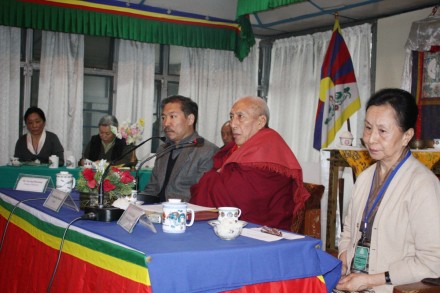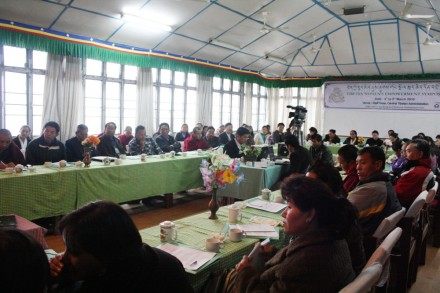
Dharamshala: A two-day deliberation on how to facilitate and empower Tibetan women to take full and active participation in social, political and economic and other administrative activities in the exile community started this morning at Gangchen Kyishong.
Around 40 women participants and representatives from departments and offices of the Central Tibetan Administration are taking part in the first-ever symposium on women empowerment from 4 – 5 March. It is an initiative of the Social and Resource Development Fund (SARD) under the supervision of the Kashag and Department of Finance.
On 2 September 2008, the incumbent 13th Kashag laid down policy vision for the empowerment of Tibetan women in the diaspora. SARD has been initiating a series of programmes including trainings, discussions, workshops and counsellings to educate and encourage Tibetan women to take more proactive role at various administrative levels.
In his keynote address to the participants, Kalon Tripa Prof Samdong Rinpoche said since the beginning of human civilization in Tibet, Tibetans in their entire history have not experienced problems such as gender inequality or gender oppression and exploitation. Particularly since the spread of Buddhism in Tibet, the importance of gender equality explained in Buddhist teachings have flourished in Tibet, and continue to do so even to this day, he added.
Kalon Tripa stressed that the “core objective of the women empowerment programme is not to demand rights for the women, but to invoke and activate the inherent power of womanhood”.
“The idea of Tibetan women empowerment is provide equal opportunity to women so that they do not lack behind in taking up their share of universal responsibility,” Kalon Tripa said.
Kalon Tripa presented the proportion of male and female participation in the Central Tibetan Administration and in various regional level institutions.
The total number of official civil servants is 464 out of which the male and female ratio is 309/155. Out of total of more than 700 staff working in Tibetan settlement offices in India and Nepal, the ratio is 446/274. The strength of women in the governing bodies of cooperative societies is low which is only 25 against 229 men. The figure is also at the low of 16 against 190 in Rawang Denpai Legul Tsokchung. Out of 206 local leaders (gyapon) only 24 are women.
Kalon Tripa said emphasis must be laid on efforts to increase the number of Tibetan women’s participation in the Tibetan parliament, local Tibetan assemblies, board of directors of cooperative societies, Rawang Denpai Legul Tsokchung and local leadership in Tibetan settlements in India, Nepal and Bhutan.
He emphasised that there should be some tangible increase in the number of Tibetan women participation in these institutions within a span of next 10 years.
A group of panelists, including Dr Juile Thekkudan of Society for Participatory Research in Asia, Ms Dolkar Wangmo, counselor at the department of education and Ms Tenzin Dhardon Sharling, research and media officer at the Tibetan Women’s Association, will preside over a panel discussion.
Kasur Jetsun Pema, Kasur Rinchen Khando and Mr Jampel Choesang, Chief Election Commissioner and Chairman of Public Service Commission were present at the inaugural session.

